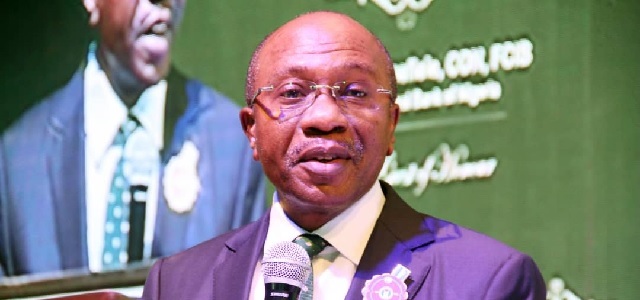Tasks Stakeholders On Doubling Palm Oil Production
Godwin Emefiele, Governor of the Central Bank of Nigeria (CBN), on Monday charged stakeholders in the palm oil value chain to consciously raise the nation’s share of global market share over the next three to five years.
Speaking on “resuscitating Nigeria’s palm oil sector,” at a stakeholders’ meeting in Abuja, he lamented the fact that the country continues to almost $500m on oil palm import annually. This narrative, Emefiele said must change with support for “improved production of palm oil to meet not only the domestic needs of the market, but to also increase our exports in order to improve our forex earnings.”
The meeting attended by governors of Edo and Akwa Ibom states and other top government officials from oil palm producing states in Abuja, Emefiele said is part of efforts to elicit critical stakeholder buy-in.
The meeting, he continued, was expected to “set a partnership model that would, with immediate effect, stimulate investments in the palm oil plantations, such that within the next 3-5 years, the global share of the country’s oil palm production would more than double. Our ultimate vision is to overtake Thailand and Columbia to become the 3rd largest producer over the next few years.”
The gathering, he continued is important, given that “it forms part of our overall strategy to reduce our reliance on crude oil imports, diversify the productive base of our economy, create jobs and conserve our foreign exchange.
“Despite placing oil palm in the forex exclusion list, official figures indicate that importation of palm oil had declined by about 40% from the peak of 506,000 metric tons in 2014 to 302,000 MT in 2017,” adding that the CBN intends to support improved production.
In this way, he said the plan is not merely about meeting needs of the domestic market, but increasing Nigeria’s exports in order to improve foreign exchange earnings.
Emefiele told participants that if Nigeria had kept faith as the world’s leading palm oil producer and the largest exporter in the late 50’s and 60’s, with close to 40% of the global market share, Nigeria could have generated close to $10bn worth of forex.
He lamented that the country is today a distant “5th among leading producers of palm oil; we barely produce up to 3% of the global supply of palm oil, with estimated production of 800,000 MT of palm oil, while countries like Malaysia and Indonesia produce 25m and 41m tonnes of palm oil respectively.
“We have also become a net importer of palm oil, importing between 400,000 – 600,000 MT of palm oil in order to meet local demand for this commodity,” despite having over 3m hectares of farmland for palm oil cultivation. Production, he added, remains just about 2 tonnes per hectare, relative to a global benchmark of 25 tonnes per hectare. This, he explained further, is because existing palm trees have matured having been planted in the 50’s, as well as low investment in replanting high yielding palm oil seeds. As some of you may know, the usual life cycle for optimum palm production is 25 years.
“If we had kept pace with our peers in supporting improved cultivation of palm oil, at the current global market price of $600 per tonne, and an assumed production level of 16m tonnes,. This analysis does not take into consideration the amount of jobs that could have been created in our rural communities from large scale small holder developments,” he lamented further.
Emefiele said Monday’s meeting is coming a fortnight after a similar parley with stakeholders in the Cotton, Textile & Garment sector where some policy measures were announced, including reinforcing the ban on the use of forex from official sources to finance import of textiles. Steps are currently being taken to penalize smugglers of textile materials who are utilizing our financial system to conduct these illegal activities.
“We also agreed that textile manufacturers will be allowed to import cotton in 2019, but they must engage in backward integration efforts that will support local cultivation of cotton, in order to feed their factories by 2020. Efforts are also being made to fast-track the financing of 100,000 cotton farmers for the 2019 farming season, in order to meet the needs of our ginneries. These measures have started bearing fruit with enquiries by various stakeholders and investors on how they can support improved production of textiles locally.”
These steps, he stressed, are necessary to address the loss of over $4bn by the nation expended on textile importation annually, besides enhancing growth in Nigeria’s agriculture and manufacturing sectors in line with the Federal Government’s determination to diversify its economic base away from a reliance on crude oil.
The move, Emefiele also assured, will insulate Nigeria’s “economy from the vagaries and shocks associated with volatility in crude oil prices.”
Plans are afoot, he noted, “to also address challenges in the cocoa, cassava, beef/cattle ranching, dairy and fish sectors,” such that every region of the country will feel the positive impact of the ongoing intervention in the agric sector.
“These efforts we hope will not only enable us to conserve our foreign exchange, but also create jobs on a mass scale. As these measures begin to bear fruits, we are very optimistic that our states will become more economically viable, given the massive economic activities that will occur from catalysing activities in our agricultural and manufacturing sectors.








